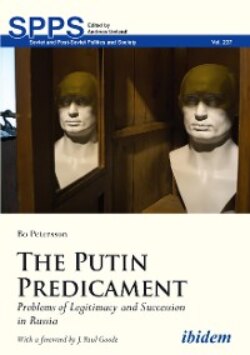Читать книгу The Putin Predicament - Bo Petersson - Страница 8
На сайте Литреса книга снята с продажи.
Main material
ОглавлениеPublic addresses by prominent political leaders are always and everywhere indispensable sources for political analysis. Speeches by a political leader function much like the public performance of a national anthem: they become sites where national politics and ultimately states themselves are performed and constructed (Butler and Spivak 2007). However tactical they are at the time of their utterance, words expressed in public tend to live a life of their own. They are made note of, remembered, and kept in store, and in cases of grave inconsistency with other statements or actions, they come back to haunt the originator, with adverse effects on their credibility (Novitskaya 2017). This argument is relevant in most settings, also in non-democratic ones. Words matter. Phrases meant to calm, assuage, deter, or inspire people will be effective if their purposes are met, but may in the end be subversive if they fail to reach their goal.
The analytical focus of this book is on how the Russian regime—the “collective Putin” (Sharafutdinova 2020; Rutland 2017b)—legitimizes Putin’s presidential rule. The bulk of the empirical material for the study comes from the official website of the president of Russia, kremlin.ru. The website collects Putin’s official statements, such as major addresses, speeches on special occasions, press conferences and interviews.
For several years, there have been certain fixed nodes in the presidential calendar. These are annually recurring and major mediatized events, indeed rituals. The most important ones are the annual address (poslaniye) to the Federal Assembly, the speech to the Valdai Discussion Club, the televised Direct Line with Vladimir Putin, and the annual News Conference with major media (Fedotenkov 2020).
These events are important as political platforms from which the president’s statements are launched to make an impact. Of the four, the annual address to the Federal Assembly is the one most regulated by form and protocol, as it sets the main policy priorities and defines the most central agenda items for the coming year (Martus 2021, Ambrosio and Vandrovec 2013). The Valdai Discussion Club is a Kremlin-sponsored annual meeting of “experts on Russia in Russia” (Novitskaya 2017). These Davos-like annual meetings are a venue where Russian leaders meet high-level academics and political practitioners from home and abroad who share an interest in Russian political affairs. Putin has met with the participants of the Valdai Club every year since the meetings were initiated in 2004 (Valdai Discussion Club 2021). Current political priorities can be inferred from his addresses to the meeting, even if the format of the discussions is relatively free from protocol. The Direct Line and the News Conference are the media events that by appearance are less structured beforehand. These are occasions when the president meets the press and the public, ostensibly unplugged, to answer their questions on different matters. The shows try to signal spontaneity but there is little doubt that they are strictly regulated in terms of access to floor and microphone. Sometimes they are used to float issues that are introduced through more formal channels later.3
Not only do the four major mediatized events differ in terms of form and structure, but they are also different regarding the primary audience for which they are aimed. In the case of the poslaniya to the Federal Assembly, national and regional elites listen attentively, regardless of whether their professional affiliation is military, political, bureaucratic, business-oriented, or other. Since the political priorities for the coming year are outlined and presented, the attention of these elites will be guaranteed. Equally certain is that foreign audiences will tune in on these events as the announcement of priorities in foreign and security policies are an important part of the messages sent. Thus, these platform speeches are intended in equal measure for foreign audiences and for domestic ones. Regarding the Valdai Club, the domestic elite audiences are again likely to be targeted, not least to cover for the case that trial balloons are sent up or new political initiatives presented. The Direct Line and the News Conference are both events which are more attuned to the public. These are occasions where Putin takes the opportunity to shine and demonstrate his omniscient power and prowess, while using a language that is accessible for his average voters (Kukshinov 2021). He endeavors to speak directly to them.
The kremlin.ru website duly reports on all these major media events, even if the records are not always made verbatim and there are occasional differences of nuance between the spoken word and the written one (Gutterman 2021). The website devotes substantial space to the events, and they are widely noted by the public. Both Russian and English language versions of the documents on the website have been consulted as there sometimes are, again, significant differences of nuance between them. The English versions are frequently shortened and condensed. One kind of source quite often referred to in this monograph is interviews by foreign mass media which are reprinted on kremlin.ru. These texts, which have often proven to be relatively outspoken, should be assumed to be directed primarily to a foreign audience.
Supplementary material has been retrieved on a regular basis from the kremlin.ru website with the use of search terms such as “succession”, “constitution”, “legitimacy” or proper names of central importance. Aside from the official sources, existing data gathered by the Levada Center, have also been used, primarily in the shape of the monthly popularity ratings. Lastly, I have of course also had the benefit of consulting the works published by colleagues who have visited similar grounds, empirical or theoretical, before me.
